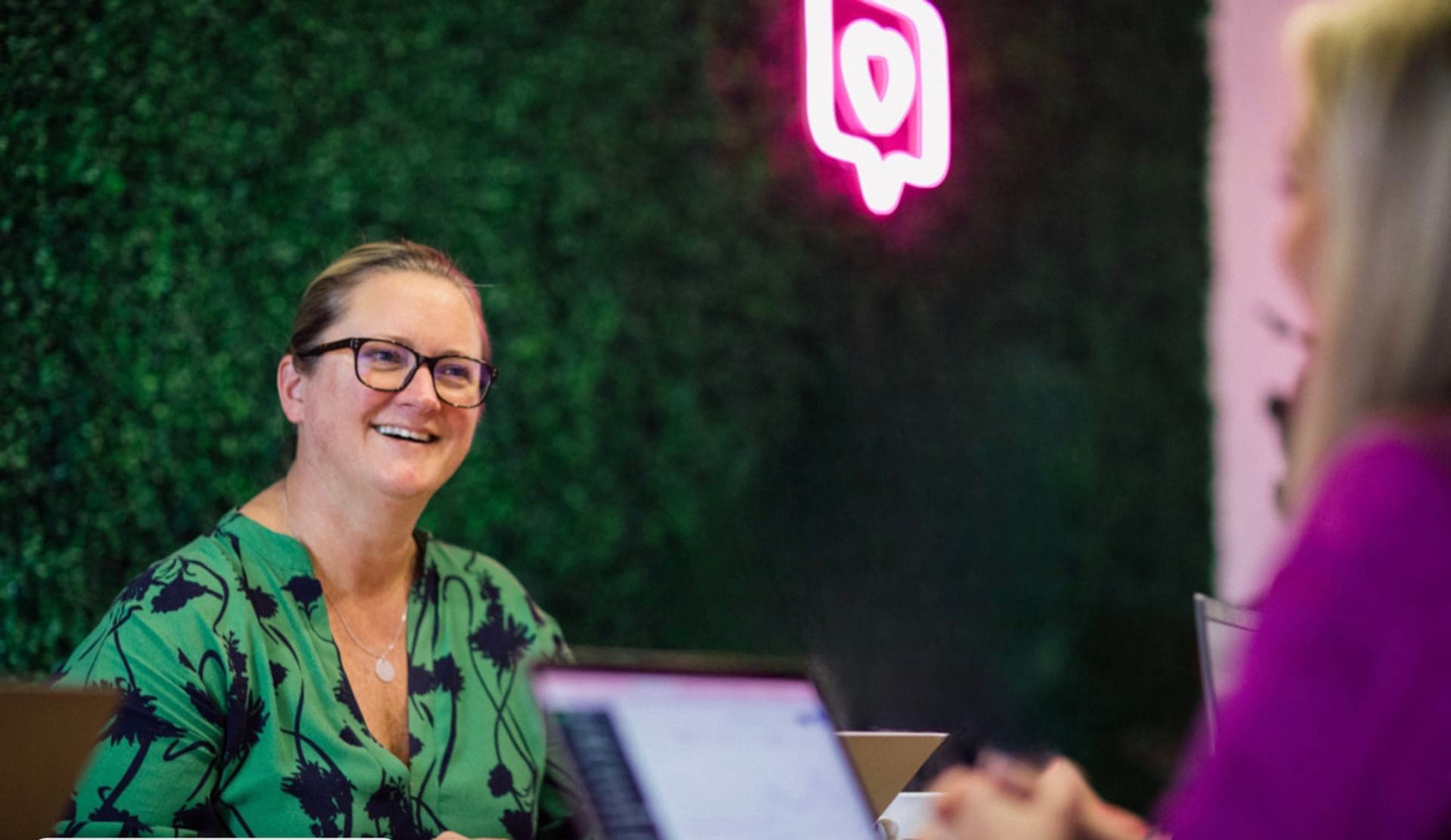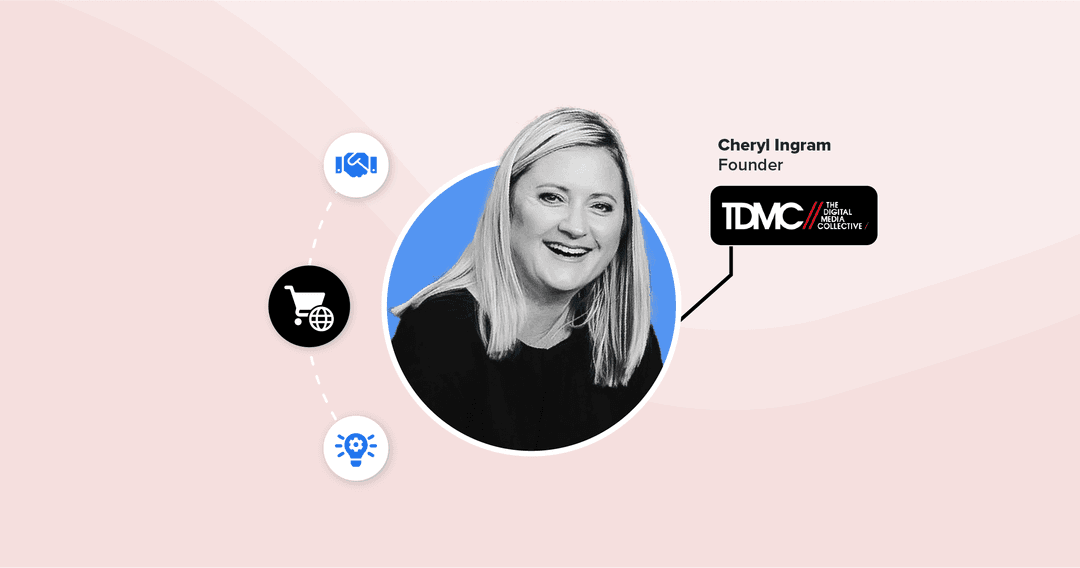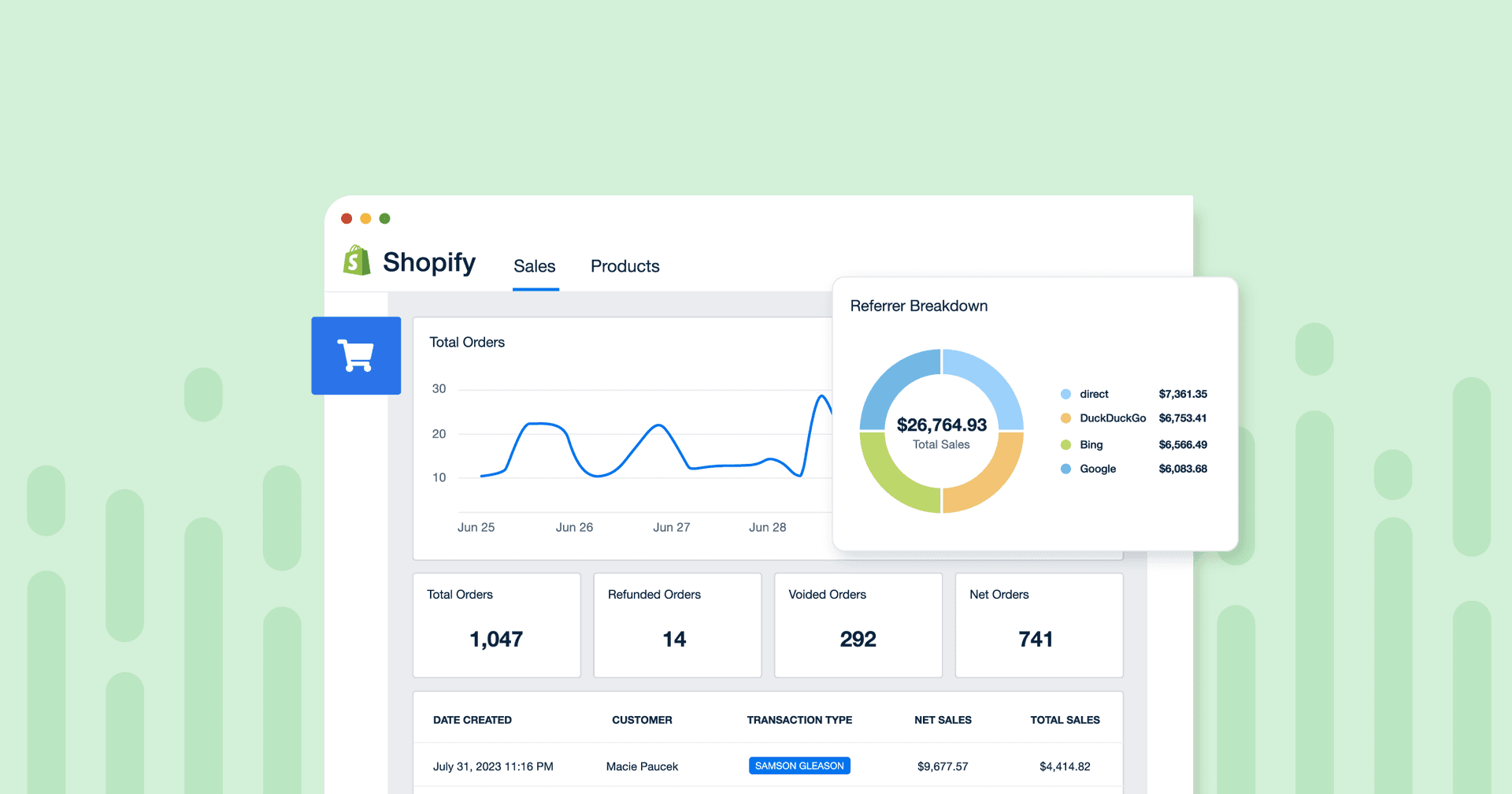Table of Contents
Table of Contents
- Getting Ahead of the Curve With Early Industry Knowledge
- Turning Cutbacks Into Opportunities
- Making Business Partnerships Through Cold-Calling Strategies
- Choosing an eCommerce Niche For Long-Term Business Stability
- Building Long-Lasting Partnerships With Diverse Retail Clients
- Aligning the Team to Strive for the Same Goal
- It's About Who and How; Not Where
7,000+ agencies have ditched manual reports. You can too.
Free 14-Day TrialHow did Cheryl Ingram’s agency, The Digital Marketing Collective (TDMC), go from 19 employees to 50 in two years?
By being resilient.
She faced multiple economic struggles in the UK and, more recently, in South Africa. However, these challenges led to new opportunities that allowed her to thrive.
Her agency now delivers eCommerce solutions to over 100 retail clients worldwide, and they’ve earned a unique title in South Africa of being the only female-founded Shopify experts.
Ingram opened up about growing her agency in a challenging and under-utilized digital environment by applying industry knowledge and expertise she gained in the UK.
Strategies like persistent cold calling and strong client communication have contributed to her long-term eCommerce success.
Getting Ahead of the Curve With Early Industry Knowledge
The eCommerce industry in South Africa wasn’t always as fast-paced compared to the Western world. However, Ingram’s career path (and her personal life) brought her back to the country where she grew up.
When her South African husband mentioned they should move back to give their daughter a similar upbringing that they had, Ingram agreed and brought her many years of digital marketing experience from the UK with her. And her determination and persistence ultimately paid off.
Not unlike other business owners, she faced challenges that made her contemplate “tapping out” and heading down a different career path altogether.
In the early days, she was under an extreme amount of stress and pressure trying to keep her South African agency’s doors open. It was difficult for Ingram to secure small-business funding while juggling the stress of managing 19 employees and being able to guarantee them salaries.
She says she was about to give up when a client of hers offered some advice that she’ll always remember:
“Just get in your boat, look ahead, and keep pedaling.”
However, it wasn't just the advice from this client that motivated her. Ingram’s digital marketing background from the UK also gave her the knowledge and expertise that she would later apply to her business in SA.
“I was very fortunate to work for MSN, UK–the digital arm of Microsoft at a time where the whole industry was just exploding in the UK,” Ingram shares.
She worked in the UK Agency Sales Team from 2000 to 2008 initially as an agency sales rep and latterly as the Head of Trading for the UK Agency business. During her time at MSN, the business grew from a sales team of 6 employees to a team of 250 by the time of her departure.
“When I joined the business, our team was responsible for a collective revenue target of $6 million. Then we became three separate teams, and in my last year with the business, my team alone was responsible for around $200 million!It was just a massive explosion in the industry,” Ingram explains.
And although things were going really well for Ingram's career at MSN, her life was taking her in a different direction.
“In 2006 I had my daughter and went off on maternity leave. It was the first time I stepped out of the business and was given an opportunity to look at it from another side,” she says.
She acknowledges that everyone’s experience is different, but hers was quite one-dimensional, and she wanted a different challenge.
“It often happens with big companies. Where you come in, you get pigeonholed, and they tell you this is your job, and you can really only follow that line within the company. I felt that I needed to expand my experiences more laterally and not so vertically,” Ingram shares.
However, during her time at MSN, she gained valuable business skills like how to empower employees internally, avoid micromanaging, and more.
“It left a phenomenal imprint on me, and if I can implement even a small part of that on my current team here, that would tick a huge success box for me personally. I will always look back on my Microsoft years fondly,” Ingram smiles.
Little did she know, her next career move would give her even more experience that would eventually lead her back to South Africa.
Turning Cutbacks Into Opportunities
She left Microsoft after her maternity leave and joined an American company called Value Click–a cost-per-click sales house. She gained end-to-end experience helping clients in her Commercial Director role for one of the company’s affiliate marketing businesses.
In 2010, Ingram and her husband had been living in the UK for 12 years and decided they wanted to move back to South Africa. Around the same time, companies across UK and Europe were struggling and needed to make financial cutbacks.
“All of these companies were making big redundancies, and I made a proposal to our board of directors,” Ingram says.
She told them if they needed to make cuts in their European subsidiaries, they might consider offshoring roles to South Africa where they could reduce costs but maintain staff counts.
“You could basically hire three people in South Africa for the cost of one junior salary in London, France, or Germany,” Ingram explains.
She was given the green light, moved back to South Africa, and established a successful branch of ValueClick in Durban, South Africa, where her team grew to 20 employees over the course of two years.
“Unfortunately, the business was put up for sale in 2013, and I was left in South Africa wondering what on Earth I was going to do next,” Ingram shares. “South Africa was just not digitally enabled in the same way that we were so used to in the UK where everything you do is online.”
It was time for Ingram to pivot again.
Making Business Partnerships Through Cold-Calling Strategies
As her current employer closed its business doors, Ingram approached a fast fashion company headquartered in Durban, SA.
“I just knocked and knocked until eventually they invited me for a chat and gave me an opportunity to pitch for their launch into Australia and the UK,” Ingram says.
She went in with an affiliate solution, and they loved it and partnered with her for their customer acquisition journey for the next six months. The company eventually parted ways with the existing marketing company and asked Ingram to handle its paid digital media plan both locally and internationally.
“That’s really where TDMC started. In fact, TDMC stood for The Digital Media Consultancy back then because it was just me and the clients I was working with,” Ingram smiles.

Image: Cheryl Ingram meeting with a client at the TDMC office.
After about two years, she partnered with another business owner who had a small development agency so she could offer services beyond media buying, like website development, for example.
They were using the Magento platform to host their clients’ websites, and in 2015, TDMC, unfortunately, had a “really disastrous build.”
“There was no Magento experience in South Africa, so I told my business partner that’s enough of Magento and that we needed to look into Shopify. That was the beginning of our Shopify journey. To be honest, it completely changed our business,” Ingram recalls.
Choosing an eCommerce Niche For Long-Term Business Stability
In 2016, Ingram was invited to attend a Shopify conference, where she had an epiphany moment.
“Anybody who can spell Google or has a Facebook page is suddenly a digital marketing agency. And they’re a dime a dozen. We really needed to reposition who we were and what we offered.” - Cheryl Ingram
Coming out of the Shopify conference, she told her then-business partner that she wanted to showcase their agency’s expertise by focusing on an eCommerce niche.
“I told him, ‘We’re not a digital marketing agency. We are going to position ourselves as an eCommerce specialist team,’” says Ingram.
And there are many pros and cons when it comes to choosing a niche for your agency. But with Ingram’s newfound business clarity, she knew her business would thrive by developing a solid understanding of how to build eCommerce sites and how to develop specialized marketing strategies to support them.
“The more performance-focused your agency is, the better,” says Ingram. “Agencies that are still making their money by selling creative services or have costs that are less tangible are going to find themselves in tricky situations,” explains Ingram. “Because the marketing channels themselves are so measurable. If you haven’t geared your business into that kind of thinking from the get-go, you’re going to struggle.”
Building Long-Lasting Partnerships With Diverse Retail Clients
Although TDMC had a great start with their large fast-fashion client, Ingram faced the challenge of the South African digital economy being different than what she was used to in the UK. South African retailers were still really slow on the uptake and digital transformation, whilst talked about in the boardroom, it was not taken all that seriously. But that all changed when COVID arrived.
“When the pandemic hit, that really sped up the digital progression in South Africa, and everyone wanted their businesses online all of a sudden,” shares Ingram.
Their portfolio now includes a variety of local clients that focus on travel, skincare, and more, and they also work with more prominent global brands like Quicksilver, Salomon, Beko, Grundig, Defy, ToysRUs, Roxy, and DC.
“We work with clients that spend 5 million Rand a month (about $275,000 USD) and others that spend 5,000 Rand a month on advertising,” explains Ingram. “Our portfolio is varied because of the risk factors that are associated. If you lose a small account, they’re easy to replace. But if you lose an account with a higher budget, it’s not easy to replace by any means.”
To ensure TDMC retains its clients and doesn’t lose one that makes such a large financial impact on her business, Ingram’s team intentionally looks to balance revenue coming in and the amount of work it will take them to deliver.
“You often find that 80% of your revenue comes from 20% of your clients. We’ve worked hard to ensure this is not the case and that our weighting is more evenly spread.” Ingram shares.
She says her accountants have given her credit for running such a “clean business,” and that’s due to her relationships with her clients.
“Right from the get-go, we tell our clients that we don’t want to be looked at as a supplier but more as a partner. And we tell them that we’ll do our best work when we’re in an environment that feels like we’re an extension of their team.” - Cheryl Ingram
And how do they build those long-lasting relationships? With consistent face-to-face engagement and communication.

Image: The TDMC office where clients and staff collaborate.
One client that Ingram’s team built a strong relationship was a direct-to-consumer company in the consumer packaged goods (CPG) industry. Their product was something that would normally be purchased as part of a monthly grocery store visit, and Ingram says launching their product online was a “bold move.”
“Their price point is low, and to make e-commerce work, meant we needed to bundle products to push up the consumer’s basket value,” Ingram explains.
When they launched their brand, Ingram’s team communicated with their client that it would be best to err on the side of caution regarding any sort of revenue KPIs.
“We developed a strong data strategy in the lead-up to their launch, and this worked very well for the client,” says Ingram.
Within just eight weeks, they achieved six figures in aggregated sales. They are now achieving between 1,500 and 2,000 sales a month, have a returning customer rate of over 50%, and an on-site conversion rate of 1.8%. Proud is an understatement.
“When we launched, we thought they might be lucky to generate 10 to 15 sales a day,” says Ingram. “So it’s very nice to see what their eCommerce store can achieve in just nine months!”
Because of their transparent communication with their client, Ingram’s team was able to test out a strategy that ultimately paid off in the long run.
“COVID has taught us that yes, we can exist in little bubbles of isolation, but actually, I think people want the in-person relationships back. I want to go for a coffee with a client and let them know that I care beyond the day-to-day and go above and beyond an e-mail.” - Cheryl Ingram
Ingram’s team makes a deliberate commitment to meet with their clients once a month, including those further away in Cape Town. And if TDMC is unavailable for a quick question, they make use of custom user permissions where their clients have access to their marketing dashboards whenever they want.
Aligning the Team to Strive for the Same Goal
Like many business owners, Ingram recognizes the importance of company culture. Her agency has a “people over profit culture” which means they’re heavily invested in creating an environment where everyone is rewarded against output.
“We’re really proud of the space we’ve created,” says Ingram. “It's a fun space where the team and clients love to converge and everyone gets a sense of that deliberate care and comfort.”
Every month, her team gets together for a month-end round-up to go over successes and things to improve on, followed by a fun social activity. They also start the year with a two-night and three-day offsite trip to set the tone for the year ahead.
“The destination is determined by where we finish as a company,” Ingram shares. “And this year, the team was determined to achieve the goal of a Safari offsite, so much so that they delivered the required number two months ahead of target!”
The culture that Ingram has worked hard to create has rewarded her with a high employee retention rate. She says they’re lucky when it comes to finding talented candidates because there’s no shortage of applications wanting to join her team.
“Fortunately, our churn rate has always been very low. However, I know that people will leave, and I encourage it,” Ingram says. “Everyone needs to see the grass is not always greener on the other side!”
As a part of her hiring process, Ingram also uses Gallup as a tool to help identify the strengths she needs in prospective candidates and says this has worked particularly well for them.
In addition, she has established an intern program that brings in aspiring candidates with no experience–something that has grown in numbers over time and has now become quite sought after as a placement opportunity for students and graduates alike.
It's About Who and How; Not Where
If there is a lesson to take from Ingram's success, is that the location of the agency matters less than the focus of its people.
Ingram's agency focuses on transparent communication and a strong data strategy to achieve success for its clients.
They have a "people over profit" culture where everyone is rewarded based on output.
The team values in-person relationships and makes an effort to meet with clients regularly, while also providing access to dashboards for continuous updates.
A focus on company culture has led to a high employee retention rate and a successful intern program.
Overall, the key takeaway is the importance of prioritizing both client relationships and internal team dynamics to drive long-term success.

Written by
Richelle Peace is a writer with a degree in Journalism who focuses on web content, blog posts, and social media. She enjoys learning about different topics and sharing that knowledge with others. When she isn’t writing, Richelle spends time teaching yoga, where she combines mindfulness, movement, and her passion for wellness.
Read more posts by Richelle PeaceSee how 7,000+ marketing agencies help clients win
Free 14-day trial. No credit card required.






